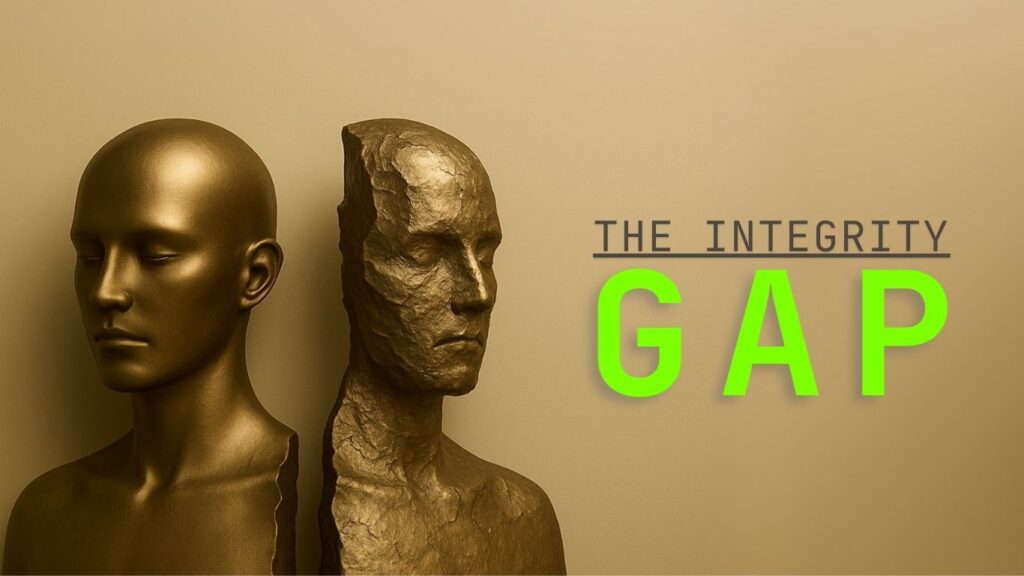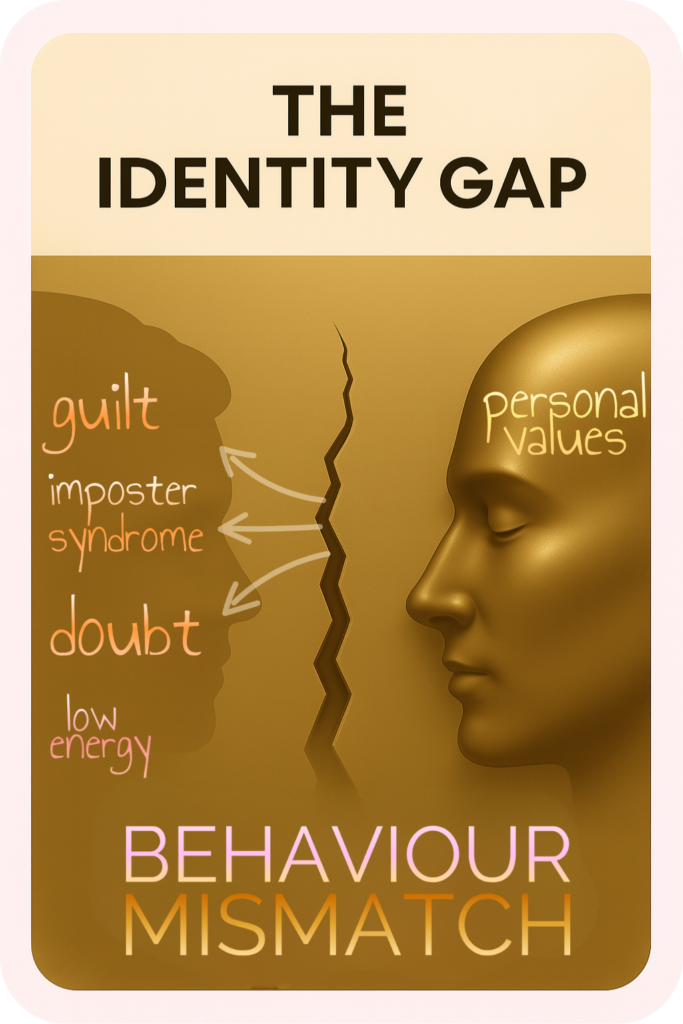Win at Life
What it is and Why it’s Useful
The Integrity Gap is the space between the principles you claim to live by and the patterns that actually show up in your day-to-day life.
It reveals itself in little contradictions – moments where your choices don’t quite match the priorities you might tell the world you have.
When there’s a mismatch between the things you value and your actual behaviour, even in subtle ways, you start to feel ‘out of sync’ with the identity you’re projecting.
You begin to think:
- “I talk about wellbeing, but I haven’t rested properly in weeks.”
- “I teach leadership, but I haven’t handled my own overwhelm well at all.”
- “People think I’m calm, but I’ve been snapping at everyone at home.”
This dissonance creates a kind of internal double-take.
You’re not lying. But you’re not fully living in truth either.
You may start to feel like you’re performing competence rather than embodying it.
This is exactly the emotional soil where issues like Imposter Syndrome tend to grow.
These inconsistencies don’t make you a fraud or a bad person. We’re all inconsistent to some degree – but the mismatch does leave a trace.
Over time, the Integrity Gap can weaken self-trust, undermine leadership, and create a low-level tension that you can’t quite put your finger on. There’s a feeling of being misaligned, and an energy drag that comes from knowing you’re out of step with who you thought you were.
That internal mismatch doesn’t always manifest as guilt – but it can quietly fuel the feeling that you’re faking it – and that’s often where Imposter Syndrome begins to take root.
The goal here isn’t perfection, it’s congruence. Reducing the distance between what you say you stand for and how you actually behave – not for anyone else’s benefit, and not to prove a point either, but to feel good about yourself.
Not for show, but for peace of mind.
Where does it come from?
This idea doesn’t belong to one discipline.
You’ll find it in therapy rooms, coaching programmes, values-based leadership, and everyday conversation where someone admits to feeling ‘a bit off’.
Carl Rogers described the psychological state of congruence as alignment between your real self, your ideal self, and your behaviour.
When these elements are out of sync, he referred to it as incongruence – a state that often leads to internal conflict or low self-worth. In that sense, the Integrity Gap can be understood as a form of lived incongruence – one that benefits from being out in the open, so it can be gently repaired.
Brené Brown has described integrity as “choosing what’s right over what’s fun, fast, or easy,” and links it directly to the ability to trust yourself.
Stephen Covey called it your “emotional bank account” – built or depleted by how consistently your actions reflect your values.
So we could say The Integrity Gap is ‘the distance between the values you claim and the way people experience you’.
However you describe it, the pattern is the same: a growing sense of dissonance, often accompanied by fatigue, self-doubt, or the creeping suspicion that you’re becoming less of the person you intended to be.
You don’t need a degree in psychology to feel the internal flinch, when it happens.
What it looks like in practice
The Integrity Gap is not usually dramatic.
It tends to widen slowly, almost politely – in situations where your outward behaviour quietly lags behind the values you believe that you hold.
It might sound like:
- Telling a client that boundaries are essential… while answering emails at midnight.
- Telling people about the importance of rest, but pushing through another overloaded week.
- Advising someone else to be more present while scrolling during your child’s bath time.
- Demanding honesty, but being conveniently economical with certain truths.
- Sharing a quote about compassion online – after barking at your partner for waking you up by mistake!
We can usually spot blatant hypocrisy, even in ourselves, but these tiny misalignments where the image you present and the choices you make part company – can more easily slip under the radar.
The problem isn’t just how this looks to other people.
It’s what it starts to do internally.
The more often your behaviour contradicts your values, the more doubt creeps in. You begin to second-guess yourself and the Integrity Gap can become not just uncomfortable – but a full-on crisis of confidence.
Try this today
Rather than diving into a full values audit, checking yourself into therapy or leaving your job, start with something simpler.
Pick one value you speak about regularly – either publicly, or just to yourself.
That might be:
- Balance
- Honesty
- Compassion
- Fairness
- Boundaries
- Leadership
- Calm
- Integrity itself
Now ask:
“If someone watched me for the past three days, would they see that value in my behaviour – or just in my language?”
Even if it’s not blatantly ‘anti’ that value, but perhaps not leaning into it enough.
If something feels off, you don’t need to change it all today.
Notice what is happening and choose a small action that moves things in the right direction.
That might mean:
- Pausing before you overcommit
- Turning your phone off during dinner
- Responding to someone with more honesty than comfort
- Or simply saying no without the extra explanation
Think course correction, rather than U-Turn.
Things to consider
- You show people who you are by what they see you do, rather than what they hear you say.
- A few small contradictions are normal, but if they continue for too long, or stack up – that mismatch starts to eat away at your confidence.
- The more often you override your own standards, the harder it is to build self-confidence.
- Most of the time, no one else will notice the Integrity Gap, but your nervous system will keep score.
- You don’t have to be perfect, but the more you can stand by your own behaviour – without flinching – the more comfortable it will be as you go through life.
- Self-respect isn’t loud, it’s built quietly – when no one’s watching.
Optional Challenge
Think of the last time you felt uneasy reflecting on an interaction – not because something necessarily dramatic happened, but because you didn’t quite live up to your own standards.
Don’t analyse it to death, just describe what happened.
Then ask yourself:
“What would it look like to handle that same moment again with more integrity?”
You’re not rewriting the past.
You’re strengthening your resolve for next time.
The challenge isn’t to dwell on it, but to catch the pattern early enough that it doesn’t become your new normal.
A Buddh-ish take
“If a man speaks or acts with a pure mind, happiness follows him like a shadow that never leaves.”
– Dhammapada, Verse 2
The point isn’t to chase happiness or approval, but to make peace with how you live. A life lived this way saves you from the urge to outrun your own shadow.
Integrity isn’t about being saintly. It’s about living in a way that doesn’t leave you backtracking, facepalming, or justifying what happened to yourself at 3 a.m.


